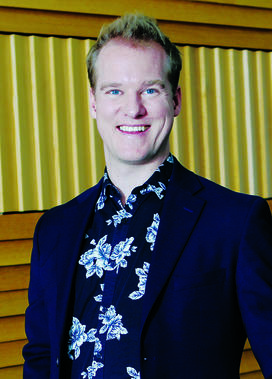Psychology Professor Erik Nook Studies Joy and Happiness
‘We maintain these myths that happiness should be the be-all and end-all of our lives,’ Nook says

What does it mean to be happy? It’s a state many people aim to achieve but struggle to reach. Erik Nook, an assistant professor of psychology who is associated with the Princeton Neuroscience Institute and directs the Logic of Emotion Lab at Princeton, has some thoughts about that. “Happiness is like a butterfly: If you chase it, it keeps flying away, but if you sit still, it will land on you,” he says. Nook, who works as a clinical psychologist at New York Anxiety Treatment and studies emotions and how they interact with language, spoke with PAW about happiness and the myths surrounding it.
How do you define happiness?
There’s a lot of theoretical debate about what emotions are. I find it helpful to remember we’re each constructing an understanding of what different emotions mean based on how we grew up, our culture, and our life experiences. That said, many people would think of happiness as a positive emotion. It signals that something good is happening or we’re looking at our current life situation as overall good. There’s also research dissecting two different types of happiness: hedonic, where things in our life make us feel good, vs. eudaimonic, where we find happiness living in line with our values and purpose. I think the extent to which any one person thinks about happiness is going to be slightly different.
What have you observed when it comes to happiness over the past few years — especially with the backdrop of the pandemic?
There are a few stories to be told there. One is a story of resilience. In the midst of a period of stress and strain we found a way to keep our life practices and institutions going, to adapt to find joy, and to celebrate good things. It’s also been really tough, and those difficulties are not equal across individuals, so it’s important to keep both sides in mind. It’s been remarkable to observe with my own patients how few are concerned with COVID at all. It might be the population I work with, but even folks who really had a hard time have been resilient.
One other thing I’ll add is that literature shows folks have developed measures of obsessions with happiness and this idea that being happy is the most important thing. What’s interesting is that those who score higher when asked how much do you want to be happy are doing much worse. There’s also research that shows generally our emotional well-being improves as we age.
That’s an interesting point, because one of the top New Year’s resolutions is to focus more on happiness. Why is this an area people struggle with?
I think it’s really unfortunate that we maintain these myths that happiness should be the be-all and end-all of our lives. Or that being happier means you’re better in some way, because the reality is, being human is hard. Having moments when we feel joyful and happy, savoring that, and deeply engaging with what you care about might actually be a better ideal than expecting high and unchanging amounts of joy. Other cultures have different ideal emotional experiences. Jeanne Tsai at Stanford has done research that found Western cultures value higher-energy emotions like excitement, while East Asian cultures value low-energy emotions like calm.
If someone comes to you and says, “I want to be happier,” what are some action steps you’d recommend?
One, check in with what you care about. What do you actually value? I think these often remain a mystery to us, so take a moment to stop and think. Then ask yourself “where are the gaps in my behavior and my values?” That might give you a sense of things that you can do to close that gap and live a more values-aligned life. Some thought-based intervention skills people can incorporate include reframing negative self-talk, savoring positive things when they happen, practicing mindfulness, and immersing yourself in gratitude. There’s a lot of research on the power of gratitude journals. On the behavior side, if fears are holding you back, challenge yourself to act (ask someone on a date, call a therapist, etc.), reward yourself, and surround yourself with mutual loving relationships.
What’s the best way to recognize or find little moments of happiness in everyday life rather than waiting for a big achievement?
Let me start off saying that is normal, but I would ask you to reflect on how that’s working for you? If you’re content, nothing needs to change, but if not, you may need to shift. Studies show big positive life events can actually be extraordinarily stressful and alienating — because not only are you coping with the stress of the event itself, but everyone around you is saying you should be so happy. I would offer the idea that we’re conflating happiness with pride. If those are the only moments in which you allow yourself to feel happy, it’s going to be really tough. What if we got to feel happy arriving to a meeting on time or checking something off our to-do list? Again, being able to savor small positive moments is a really important skill to maintain mental health.
Interview conducted and condensed by C.S.











1 Response
John Vine ’86
2 Years AgoHappiness and a Fulfilling Life
Excellent interview/article, Erik. I would add that if an individual’s primary focus is the accumulation of wealth, he/she is less likely to achieve a fulfilled, “happy” life.